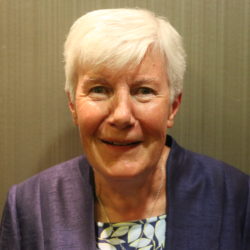The Chapter takes cognisance of the many situations and events which contribute to the abuse of women. We therefore take steps in collaboration with other groups to minimize the evil effects of trafficking and prostitution. (South African Provincial Chapter 2006 – Acts of Chapter)
As we became aware that the trafficking in human persons is the most heinous of organised crime that affects every country in the world, we realised that the Sisters of the South African Province are being called to do what we can to combat this evil.
The First Steps
South Africa is a country of origin, transit and destination for trafficked persons and so, much work can be done on many fronts. The only way that we can begin to combat trafficking is by working with others. At an inter-congregational meeting held in Pretoria in May, the decision was made to form a core working committee that would research trafficking in human persons in general and in South Africa in particular. The committee met with members of the International Organisation for Migration (IOM) who gave us posters and information brochures that could be distributed at churches and schools. This was the first step.
A field worker from IOM was invited to speak to the students of Rosebank Mercy School in Johannesburg. The girls were greatly affected by what they heard about trafficking. In fact one of them was inspired to write a play about trafficking. This was staged for the other students and their parents who were greatly moved by the performance.
Southern African Counter Trafficking Training Course – Cape Town
In October, the IOM organised a counter trafficking workshop for women religious from Southern Africa. Three Mercy Sisters, Kathleen Power, Aine Lohan and Colleen Wilkinson, were invited to participate in this training. 42 Sisters gathered at the Schoenstatt Retreat Centre in Cape Town for the workshop.
The course began with a presentation on the root causes of trafficking. An increase in poverty, globalisation and the feminisation of migration make millions of human beings easy prey for traffickers. Factors that contribute to trafficking include:
- discrimination against certain groups of persons
- lack of effective legislation (as in South Africa)
- low rate of enforcement of laws where they do exist .
The second day of the workshop brought the horrors of trafficking nearer home: we heard of the activities of traffickers in our own country and the health risks associated with this modern form of slavery.
The last three days were devoted to training in basic skills on how to help a victim of trafficking and how to deal with burn-out which is a very real risk for persons dealing with the trauma and suffering experienced in this type of work.
On the final day the Sisters met in groups according to their geographical locations, to make plans for the future. A follow-up workshop will be held in Johannesburg in March 2008.
 Participants of the Southern African Counter-Trafficking Workshop
Participants of the Southern African Counter-Trafficking Workshop
International Conference Of Women Religious – Rome
Between October 15th and 20th 2007, women religious from around the world met in Rome to form a global network aimed at combating human trafficking. 33 Sisters from 26 countries and representing 25 congregations participated in the conference. Colleen Wilkinson rsm was asked by the Leadership Conference of Consecrated Life to represent South African religious in Rome.
The conference, sponsored by the U.S. Embassy to the Holy See and the Italian Union of Major Superiors, brought together women religious already active in the field of combating human trafficking. The aim was to develop and strengthen networking mechanisms and communication so as to address the problem of trafficking in persons (TIP) in countries of origin, transit and destination.
The programme included lectures by international TIP experts. Dr. Esohe Agathise of IROKO shared her expertise on the strength of networking among countries, and further information on networking was shared by Sebastien Dechamps of Caritas Internationalis and Natalia Kovaliv of COATNET (Christian Organisations Against Trafficking in Women Network). The participants also presented reports on the trafficking situation in their respective countries and how women religious are responding.
The last session of the conference was open to other religious residing in Rome and to the media. The Sisters had prepared a public statement on trafficking in human persons and this was read at this session. The statement and reports of the conference have been published in Catholic newspapers around the world.
 Brenda Dolphin rsm, Andreja Caks DC of SVdP, Colleen Wilkinson rsm and Henrietta Adindu SHCJ at the closing session of
Brenda Dolphin rsm, Andreja Caks DC of SVdP, Colleen Wilkinson rsm and Henrietta Adindu SHCJ at the closing session of
the Conference on Human Trafficking
Collaboration
The Mercy Sisters in Pretoria have established a shelter for abused women. This shelter is also a place of safety for women who have been trafficked and are waiting for repatriation to their own countries. IOM has a contract with the shelter to provide this service while their staff arrange for travel documents for the women.
The problem is so vast there is a danger of our being overwhelmed by it. Let us remember that we are not alone: we have the support of our Foundress who would definitely have involved herself in this struggle: we have infinite heavenly support as well as the support of many other organisations and individuals equally devoted to ridding our society of this scourge.
The great tragedy of our world is all the people who have done nothing because they saw they could only do a little. (A quotation at the entrance to Robben Island Cape Town.)


